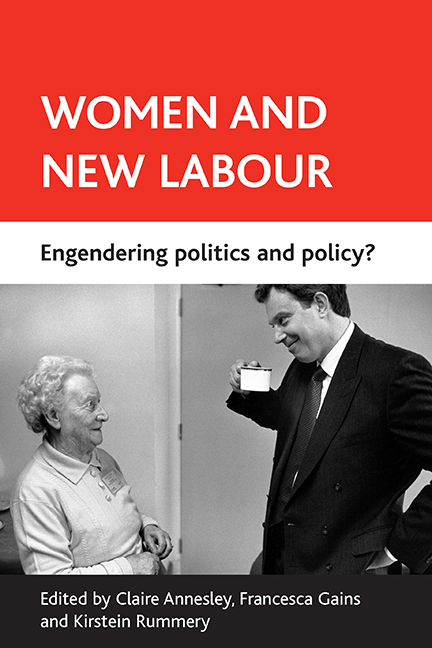one - Feminising politics and policy: the impact of New Labour
Published online by Cambridge University Press: 15 September 2022
Summary
Introduction: Women and New Labour
The iconic, but now rather clichéd, image of Tony Blair and the 101 female Labour MPs elected to the 1997 House of Commons sent a signal to the world that New Labour and women somehow go ‘hand in hand’. Undeniably, the 1997 General Election was significant in gender terms because Labour returned a record number of female MPs thanks to its use of all women shortlists (AWS) in selecting candidates for that election. Moreover, the party's landslide victory that year was made possible by the massive swing in the female votes from the Conservatives to New Labour: remarkably, in 1997, 44% of women voted for Blair's government. And, in government, Labour has made bold claims about what it is doing for women. Indeed, in 2005 the then Minister for Women, Tessa Jowell, went so far as to claim that the Blair administration was the ‘most feminist Government in our history’ (The Times (2005) ‘Gender pay gap “may never go’’’, 5 December).
At face value, New Labour in government appears to have done much to ‘feminise politics’. That means, using Lovenduski's (2005) definition, to act for women, to take on women's concerns and to make a difference to women's lives. Of course, there is no consensus on what ‘women's concerns’ entails or on what the feminist movement demands (Bacchi 1999; Chappell 2004). Labour has implemented changes within the party itself, the UK system of governance and in key policy areas – from economic to welfare to international policy – all of which have had significant implications for women. Yet, the jury is still out on whether New Labour really is committed to feminising politics or whether these achievements are the unintended consequences of other policy initiatives.
Meg Russell (2005) argues that New Labour only became associated with progress for women because the party's election in 1997 coincided with the election of 101 women MPs. Yet that achievement in women's representation was really the consequence of a longer campaign by women and Left-wing activists in the party dating back to the early 1980s; it was not New Labour's doing.
- Type
- Chapter
- Information
- Women and New LabourEngendering Politics and Policy?, pp. 3 - 24Publisher: Bristol University PressPrint publication year: 2007



